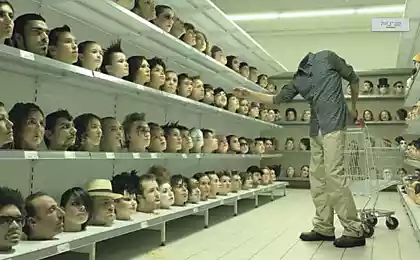500
He can, but can't: what scientists think about functional illiteracy
Functional illiteracy is the inability to read, write and count at the level required to solve the simplest everyday tasks. Available secondary education should give these skills to everyone — but in practice up to a quarter of the adult population of developed countries may not understand what is written on the box of medication purchased at the pharmacy.
We decided to respond to the popularity of the phenomenon of expert opinion and asked researchers from the field of neuroscience and sociology about how functional illiteracy occurs and whether it is a consequence of a global conspiracy of marketers or decrease of the level of intelligence due to the penetration of Internet into all spheres of human life.

"A hundred years ago, before the advent of these technologies, a large part of the population could neither read nor write" Yury Shtyrov, neuroscientist, Professor, head. the magnetoencephalography lab at Aarhus University (Denmark); senior research fellow, head. the laboratory of the Center for neuroeconomics and cognitive studies based on functional illiteracy, apparently, there is no single physiological disturbance. It can occur due to issues of visual character, and cognitive disorders. There are different disorders understanding language: a basic inability to perceive combinations of letters to violations of syntactic or pragmatic analysis. Sometimes the text is perceived incorrectly due to the fact that the brain simply can not cover sufficient for the perception of speech amount of visual information. More often, however, speak of violations of the segmentation coherent analysis of textual information — when impossible is the translation of the visual code to phonological. In this case, we can see the text, but the brain is unable to convey the prisoner therein information for further analysis, enable the trace memory reading, etc.
In the scientific literature separately allocated dyslexia, which is considered a clinical psychological problem and occurs quite often: depending on the diagnostic approach and age group, she faces up to 15-20% of the population. While 2-4% of the problems can be more severe. Dyslexia with disrupted processing of the text as such, although other systems of the brain externally, working more or less full, the intellect is developed, and speaking normal. Dyslexia is considered a developmental disorder, but may also occur as a concomitant deviation of the other disorders.
Dyslexia is by far often (but not always) is the cause of functional negramotnov, although the degree of dyslexia can be different: some will never learn to read, and someone (if the time to begin to engage in a special program) can achieve significant progress. The causes of dyslexia lie on a neurobiological level, but the specific mechanisms of occurrence of this disorder is still unclear. Curiously, how often it occurs, depends on what language you speak, read and write. Text information in different languages is perceived by the brain in different ways, and one spelling system is easier to process than others. For example, in the Russian written text more or less match the sounds of oral speech, but the French, English or Danish is much harder, which is very difficult learning to read for children. As a result, in countries with such languages the number of people with disorders of perception of the text is higher. At the opposite pole is, for example, Finnish, where almost every sound of speech corresponds to the letter or pair of letters.
"There are so-called critical age for language development: in 6-7 years, the plasticity of the nervous system begins to decline"
In some cases, associated with reading problems can be explained from the point of view of attention deficit. And someone just did not really learned to read, because you have not given this enough time. Internet and TV is largely to blame. But if they just take the child, and he does not have time to learn to read, write and count, whether it is necessary to seek a medical explanation? I do not presume to assert this. A hundred years ago, before the advent of these technologies, a large part of the population could neither read nor write. How many functionally illiterate people then, and what was the ratio of causes of this condition? It is not known. We only know that dyslexia was observed before the advent of modern information technology — its first scientific description was made in the XIX century. At least partly this disorder is genetically determined.
The changes brought about by modern technology is the changes of the last decades. However, they do not occur by themselves, but in the context of the General changes people's lives. It is not only that we watch TV — we read less. Without practice any skill disappears or does not develop. I think the indirect influence of television and the Internet on the competence of reading there, but I wouldn't argue that they are harmful to the ability to read as such. Another thing is that the Internet is not always have full feedback: here write errors, use simple and colloquial vocabulary. Incorrect simplified forms are fixed and are no longer seen as an error.

Unfortunately, in our case is limited not only time in the day to be spent on literacy development, but also the life time. There is a so-called critical age for language development: in 6-7 years, the plasticity of the nervous system begins to decline, and this affects the ability to develop cognitive skills in the first place, apparently, language. As oral language, reading is a very complex skill: in fact, we communicate quite random arbitrary combination of lines and circles with the sounds, words and meaning, combine all of this into sentences and try to understand the General meaning of the text. Despite the seeming simplicity of this skill, from the brain reading requires tremendous effort and teamwork of many millions of neurons and neural networks in various fields. If we miss the moment when the brain is maximally plastic, able to create new connections and build new representation for information in the future to do this it will be more difficult. That's why when a child is books busy with cartoons or computer games, he probably misses the opportunity, which would be difficult or even impossible to fill.
"Illiteracy is, as a rule, from the family of" Vera Chudinova, Vice-President of Russian reading Association, Deputy Chairman of the research Committee "Sociology of childhood" of the Russian society of sociologists, candidate of pedagogical Sciences Functional illiteracy — the inability to live in modern society is, above all, the inability to read well, write and count. Illiteracy is related to society, since to learn and to adequately adapt to life in a changing world (learn a new profession, for example), you need to be able to read. Also, over time, to reading, writing and arithmetic added digital literacy: the ability to work on the computer and use information and matching networks. This is a basic skill now. However, the term "functional illiteracy" is constantly expanding. Because life in modern society requires economic, legal and other types of literacy.
It is important from childhood to learn to read and work with information. Means a lot, the habit of parents to read on their own and pay attention to creative leisure activities for children. Illiteracy is, as a rule, from the family.
Error of the teaching process in terms of functional illiteracy not play a big role: the education system in General. Of course, the schools have teachers whose children learn better or worse than others, but it does not matter to him. In some countries — in Finland, for example, is specifically correct skills and reading skills that students can correct their flaws and become well read — and so we began to study. And for adults — healthy people in many countries there are special training programs to improve reading and computer literacy. Educated people able to think critically and to take more accurate and reliable information from sources of different types, the illiterate — no.
"Educated people in Russia often remain without work" Oleg Podolsky, head of the "Designing learning and competency development", Institute of education, HSE In 2013 were published the results of the first study PIAAC (Programme for the International Assessment for Adult Competencies), focus on key competences of the adult population. It was attended by both OECD (Organization for economic cooperation and development) and partner countries, including Russia. In the international report on the results of this study elaborates on the possible reasons for the low level of literacy in different countries. The highest results in reading literacy observed in Japan, Belgium, Finland, the Netherlands. In these countries, in General, and achievement of adults by results of research high and people with low levels of functional literacy a bit. There is a hypothesis that this is due to the high quality of school education, on the one hand, and with a high level of social guarantees, on the other: many people have access to quality education. In these countries the level of literacy has little to do with the level of education of his parents. On the other hand, members of the public, indeed, has caused some surprise that in such economically developed countries as the USA and UK, people with a low level of functional literacy was about one-third of all surveyed adult population. Often, people with inadequate education and children of parents with low levels of education. Because in reality not everybody has access to quality education.
In Russia revealed a medium (in comparison to other OECD countries) the level of reading literacy of adults, with scatter of results is small: people with extremely low levels of literacy little, but a little too high. As he wrote the classic, "we all learned a little something and somehow...", and that, apparently, just enough to show average results.
The results of the international study were not directly aimed at figuring out who is smarter: the leaders or their subordinates, but some interesting facts to reveal managed. The results shows that Russian CEOs are just more competent than the workers, and more competent than the specialists with higher education. Not much, but nevertheless. So that we can sleep peacefully: in boss we get people in a sense "competent". In other countries (e.g., Czech Republic, UK) observed a trend that some experts with higher education still more competent leaders. As we know, good people may get more of their leaders.
However, educated people in Russia are likely to remain unemployed than the OECD average. But this is probably more a question for opportunities in the labour market, which should attract and use national capacity, skills and competencies of the adult population in the right direction.
"People with higher levels of reading literacy more successfully cope with the solution of the so-called task in a technology rich environment"
The high level of competence in Russia today demonstrate people 45-49 years of age, and if we talk about the results of the study, then there may be a variety of reasons. The simple features of the sample of the study PIAAC. It is representative of the whole country, but the goal is to make the representative of each age cohort (for example, every five years from 16 to 65, then to compare people of different ages) was not raised. At the same time, given that this pattern is characteristic only for our country and, for example, for Slovakia (in other countries the highest level of competence was observed in the average persons 30-35 years), there is an assumption that people who at the time of the study was 45-49 years, received in the Soviet years the most quality education. But, again, this hypothesis requires serious examination.
Ways to reduce the level of functional illiteracy, of course, exist. In many countries there are programs of adult literacy: the various programmes of continuous training and development courses. Many of them were built in an informal setting. Whole system to maintain the desired level of adult literacy, active in Canada, the UK and other countries where these issues are paying attention to, has already proved its efficiency.
On the question of whether the impact on the formation of low competences in reading and mathematics, excessive computer and television, cannot be answered unambiguously. Large-scale studies of adult literacy was conducted when in the homes of the people there was no TV, and computers even more so. In addition, it is important to understand what it means to "overreliance on computer" — if we are talking about using the computer to solve professional tasks, then there is rather the opposite situation: without a certain level of reading literacy and mathematical literacy today, in principle, will not do, and to work with the computer they a key. A similar relationship was found in the study: people with higher levels of reading literacy more successfully cope with the solution of the so-called task in a technology rich environment. If we are talking about the impact on reading literacy of excessive TV viewing, Internet use and computer games, it's hard to draw any comprehensive conclusions. It makes sense to conduct a separate study to find out how, for example, related to reading, how much time per day a grown man playing online games or watching Comedy. Then we can more accurately answer this question.
P. S. And remember, just changing your mind — together we change the world! ©
Source: theoryandpractice.ru
We decided to respond to the popularity of the phenomenon of expert opinion and asked researchers from the field of neuroscience and sociology about how functional illiteracy occurs and whether it is a consequence of a global conspiracy of marketers or decrease of the level of intelligence due to the penetration of Internet into all spheres of human life.

"A hundred years ago, before the advent of these technologies, a large part of the population could neither read nor write" Yury Shtyrov, neuroscientist, Professor, head. the magnetoencephalography lab at Aarhus University (Denmark); senior research fellow, head. the laboratory of the Center for neuroeconomics and cognitive studies based on functional illiteracy, apparently, there is no single physiological disturbance. It can occur due to issues of visual character, and cognitive disorders. There are different disorders understanding language: a basic inability to perceive combinations of letters to violations of syntactic or pragmatic analysis. Sometimes the text is perceived incorrectly due to the fact that the brain simply can not cover sufficient for the perception of speech amount of visual information. More often, however, speak of violations of the segmentation coherent analysis of textual information — when impossible is the translation of the visual code to phonological. In this case, we can see the text, but the brain is unable to convey the prisoner therein information for further analysis, enable the trace memory reading, etc.
In the scientific literature separately allocated dyslexia, which is considered a clinical psychological problem and occurs quite often: depending on the diagnostic approach and age group, she faces up to 15-20% of the population. While 2-4% of the problems can be more severe. Dyslexia with disrupted processing of the text as such, although other systems of the brain externally, working more or less full, the intellect is developed, and speaking normal. Dyslexia is considered a developmental disorder, but may also occur as a concomitant deviation of the other disorders.
Dyslexia is by far often (but not always) is the cause of functional negramotnov, although the degree of dyslexia can be different: some will never learn to read, and someone (if the time to begin to engage in a special program) can achieve significant progress. The causes of dyslexia lie on a neurobiological level, but the specific mechanisms of occurrence of this disorder is still unclear. Curiously, how often it occurs, depends on what language you speak, read and write. Text information in different languages is perceived by the brain in different ways, and one spelling system is easier to process than others. For example, in the Russian written text more or less match the sounds of oral speech, but the French, English or Danish is much harder, which is very difficult learning to read for children. As a result, in countries with such languages the number of people with disorders of perception of the text is higher. At the opposite pole is, for example, Finnish, where almost every sound of speech corresponds to the letter or pair of letters.
"There are so-called critical age for language development: in 6-7 years, the plasticity of the nervous system begins to decline"
In some cases, associated with reading problems can be explained from the point of view of attention deficit. And someone just did not really learned to read, because you have not given this enough time. Internet and TV is largely to blame. But if they just take the child, and he does not have time to learn to read, write and count, whether it is necessary to seek a medical explanation? I do not presume to assert this. A hundred years ago, before the advent of these technologies, a large part of the population could neither read nor write. How many functionally illiterate people then, and what was the ratio of causes of this condition? It is not known. We only know that dyslexia was observed before the advent of modern information technology — its first scientific description was made in the XIX century. At least partly this disorder is genetically determined.
The changes brought about by modern technology is the changes of the last decades. However, they do not occur by themselves, but in the context of the General changes people's lives. It is not only that we watch TV — we read less. Without practice any skill disappears or does not develop. I think the indirect influence of television and the Internet on the competence of reading there, but I wouldn't argue that they are harmful to the ability to read as such. Another thing is that the Internet is not always have full feedback: here write errors, use simple and colloquial vocabulary. Incorrect simplified forms are fixed and are no longer seen as an error.

Unfortunately, in our case is limited not only time in the day to be spent on literacy development, but also the life time. There is a so-called critical age for language development: in 6-7 years, the plasticity of the nervous system begins to decline, and this affects the ability to develop cognitive skills in the first place, apparently, language. As oral language, reading is a very complex skill: in fact, we communicate quite random arbitrary combination of lines and circles with the sounds, words and meaning, combine all of this into sentences and try to understand the General meaning of the text. Despite the seeming simplicity of this skill, from the brain reading requires tremendous effort and teamwork of many millions of neurons and neural networks in various fields. If we miss the moment when the brain is maximally plastic, able to create new connections and build new representation for information in the future to do this it will be more difficult. That's why when a child is books busy with cartoons or computer games, he probably misses the opportunity, which would be difficult or even impossible to fill.
"Illiteracy is, as a rule, from the family of" Vera Chudinova, Vice-President of Russian reading Association, Deputy Chairman of the research Committee "Sociology of childhood" of the Russian society of sociologists, candidate of pedagogical Sciences Functional illiteracy — the inability to live in modern society is, above all, the inability to read well, write and count. Illiteracy is related to society, since to learn and to adequately adapt to life in a changing world (learn a new profession, for example), you need to be able to read. Also, over time, to reading, writing and arithmetic added digital literacy: the ability to work on the computer and use information and matching networks. This is a basic skill now. However, the term "functional illiteracy" is constantly expanding. Because life in modern society requires economic, legal and other types of literacy.
It is important from childhood to learn to read and work with information. Means a lot, the habit of parents to read on their own and pay attention to creative leisure activities for children. Illiteracy is, as a rule, from the family.
Error of the teaching process in terms of functional illiteracy not play a big role: the education system in General. Of course, the schools have teachers whose children learn better or worse than others, but it does not matter to him. In some countries — in Finland, for example, is specifically correct skills and reading skills that students can correct their flaws and become well read — and so we began to study. And for adults — healthy people in many countries there are special training programs to improve reading and computer literacy. Educated people able to think critically and to take more accurate and reliable information from sources of different types, the illiterate — no.
"Educated people in Russia often remain without work" Oleg Podolsky, head of the "Designing learning and competency development", Institute of education, HSE In 2013 were published the results of the first study PIAAC (Programme for the International Assessment for Adult Competencies), focus on key competences of the adult population. It was attended by both OECD (Organization for economic cooperation and development) and partner countries, including Russia. In the international report on the results of this study elaborates on the possible reasons for the low level of literacy in different countries. The highest results in reading literacy observed in Japan, Belgium, Finland, the Netherlands. In these countries, in General, and achievement of adults by results of research high and people with low levels of functional literacy a bit. There is a hypothesis that this is due to the high quality of school education, on the one hand, and with a high level of social guarantees, on the other: many people have access to quality education. In these countries the level of literacy has little to do with the level of education of his parents. On the other hand, members of the public, indeed, has caused some surprise that in such economically developed countries as the USA and UK, people with a low level of functional literacy was about one-third of all surveyed adult population. Often, people with inadequate education and children of parents with low levels of education. Because in reality not everybody has access to quality education.
In Russia revealed a medium (in comparison to other OECD countries) the level of reading literacy of adults, with scatter of results is small: people with extremely low levels of literacy little, but a little too high. As he wrote the classic, "we all learned a little something and somehow...", and that, apparently, just enough to show average results.
The results of the international study were not directly aimed at figuring out who is smarter: the leaders or their subordinates, but some interesting facts to reveal managed. The results shows that Russian CEOs are just more competent than the workers, and more competent than the specialists with higher education. Not much, but nevertheless. So that we can sleep peacefully: in boss we get people in a sense "competent". In other countries (e.g., Czech Republic, UK) observed a trend that some experts with higher education still more competent leaders. As we know, good people may get more of their leaders.
However, educated people in Russia are likely to remain unemployed than the OECD average. But this is probably more a question for opportunities in the labour market, which should attract and use national capacity, skills and competencies of the adult population in the right direction.
"People with higher levels of reading literacy more successfully cope with the solution of the so-called task in a technology rich environment"
The high level of competence in Russia today demonstrate people 45-49 years of age, and if we talk about the results of the study, then there may be a variety of reasons. The simple features of the sample of the study PIAAC. It is representative of the whole country, but the goal is to make the representative of each age cohort (for example, every five years from 16 to 65, then to compare people of different ages) was not raised. At the same time, given that this pattern is characteristic only for our country and, for example, for Slovakia (in other countries the highest level of competence was observed in the average persons 30-35 years), there is an assumption that people who at the time of the study was 45-49 years, received in the Soviet years the most quality education. But, again, this hypothesis requires serious examination.
Ways to reduce the level of functional illiteracy, of course, exist. In many countries there are programs of adult literacy: the various programmes of continuous training and development courses. Many of them were built in an informal setting. Whole system to maintain the desired level of adult literacy, active in Canada, the UK and other countries where these issues are paying attention to, has already proved its efficiency.
On the question of whether the impact on the formation of low competences in reading and mathematics, excessive computer and television, cannot be answered unambiguously. Large-scale studies of adult literacy was conducted when in the homes of the people there was no TV, and computers even more so. In addition, it is important to understand what it means to "overreliance on computer" — if we are talking about using the computer to solve professional tasks, then there is rather the opposite situation: without a certain level of reading literacy and mathematical literacy today, in principle, will not do, and to work with the computer they a key. A similar relationship was found in the study: people with higher levels of reading literacy more successfully cope with the solution of the so-called task in a technology rich environment. If we are talking about the impact on reading literacy of excessive TV viewing, Internet use and computer games, it's hard to draw any comprehensive conclusions. It makes sense to conduct a separate study to find out how, for example, related to reading, how much time per day a grown man playing online games or watching Comedy. Then we can more accurately answer this question.
P. S. And remember, just changing your mind — together we change the world! ©
Source: theoryandpractice.ru























